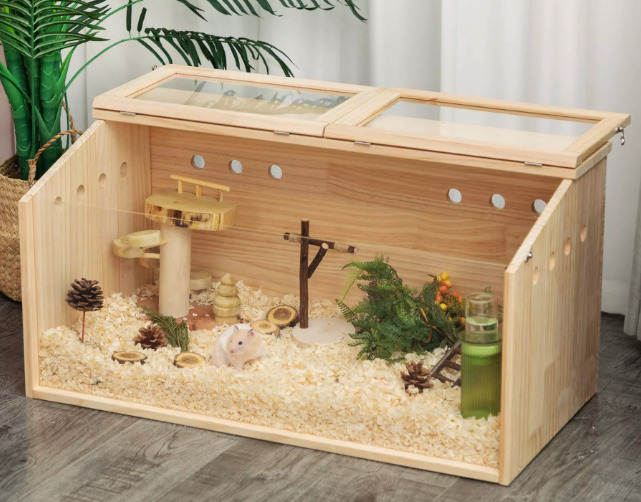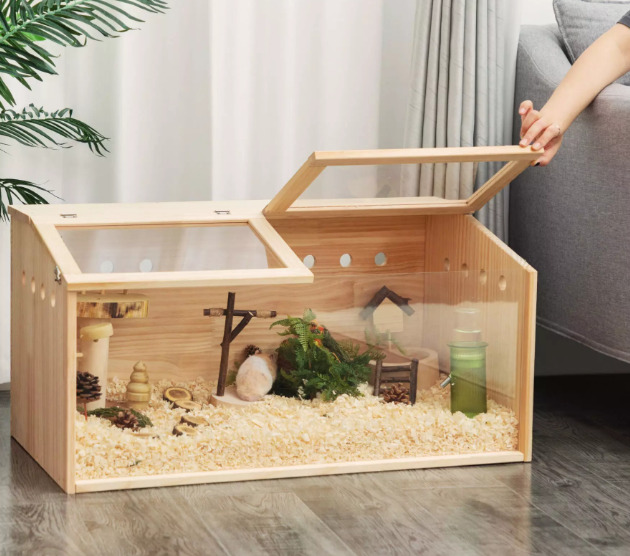Are you thinking about getting a hamster as a pet? One of the essential things to consider when bringing a new furry friend into your life is how long they are likely to live. Hamsters are popular pets, known for their adorable appearance and playful nature. But, like all living creatures, they have a limited lifespan. In this blog post, we’ll explore the factors that influence a hamster’s lifespan and provide you with some tips on how to help your hamster live a long and healthy life in hamster cages.
Factors Affecting Hamster Lifespan in Hamster Cages
Species: There are several species of hamsters kept as pets in hamster cages, with the Syrian hamster being the most common. Syrian hamsters typically live longer than dwarf hamsters, with an average lifespan of 2 to 3 years, while dwarf hamsters tend to live for about 1.5 to 2 years.
Genetics: Just like in humans, genetics play a significant role in a hamster’s lifespan. Some hamsters may have a genetic predisposition to certain health issues that can affect how long they live.
Diet: A hamster’s diet is crucial to their overall health and longevity. Feeding your hamster a balanced diet of hamster pellets, fresh vegetables, and occasional treats in the cage for hamster can help ensure they get the nutrients they need.
Exercise: Providing your hamster with plenty of opportunities for exercise is essential. Hamsters are active creatures that need space to run, play, and explore. A spacious hamster cage with a hamster wheel and toys can help keep them physically and mentally stimulated.
Stress: Stress can have a detrimental impact on a hamster’s health. Ensure that your hamster cage is quiet and free from disturbances. Handling your hamster gently and without excessive force can also reduce stress.
Healthcare: Regular veterinary check-ups are vital for identifying and addressing any health issues early on. Hamsters are good at hiding illness, so it’s essential to monitor their behavior and appearance for any signs of illness.

Environmental Temperature and Humidity: Hamsters are sensitive creatures, and their health is influenced by the environmental temperature and humidity. Ensure that your hamster cages are maintained within the appropriate temperature range, typically between 18 to 24 degrees Celsius (64 to 75 degrees Fahrenheit), and avoid exposing them to extreme temperatures.
Water Supply: Keeping your hamster’s water source clean and providing fresh water at all times is crucial. Dehydration can have a severe impact on their health. Make sure the water bottle in hamster cages is not clogged or leaking and check the water supply regularly.
Social Factors: Hamsters are solitary animals and typically do not require companionship. However, if you decide to house two hamsters together, monitor their interactions closely to prevent fights and stress and offer a 2 story hamster cage, which can impact their lifespan.
Breeding and Reproduction: If you plan to breed hamsters, ensure that you are aware of the risks and responsibilities involved. Irresponsible breeding practices can have a negative impact on hamster lifespan and result in an excess of hamsters that are challenging to care for.
Noise and Disturbances: Avoid placing your hamster cages in noisy or frequently disturbed areas. Excessive noise and disturbances can lead to increased stress in hamsters, which in turn can affect their lifespan.
Tips for Extending Your Hamster’s Lifespan in Hamster Cages
Now that we’ve discussed the factors that influence a hamster’s lifespan, let’s explore some tips for helping your hamster live a longer, happier life.
Choose the Right Cage: Provide your hamster with a spacious hamster cage that allows for proper ventilation and exercise. A cage with multiple levels and tunnels can offer enrichment and mental stimulation.
Proper Diet: Feed your hamster a balanced diet that includes commercial hamster pellets, fresh vegetables, and small amounts of fruit in hamster cages. Avoid feeding them sugary or fatty treats excessively. Hamsters need protein in their diet for muscle health. You can provide protein through small portions of cooked chicken, boiled egg, or mealworms. Ensure that any protein sources are thoroughly cooked and served in small amounts.
Clean Living Environment: Keep your hamster cages clean by removing waste and soiled bedding regularly. A clean environment reduces the risk of illness.
Safe Toys and Accessories: Ensure that the toys and accessories in your hamster cages are safe and free from small parts that could be ingested. Wooden chew toys are excellent for keeping their teeth healthy.

Avoid Overcrowding: Hamsters are solitary animals and should be housed alone. Keeping multiple hamsters in the same hamster cage can lead to stress and fights.
Regular Handling: Handle your hamster gently and regularly to build trust and reduce stress. Wash your hands before and after handling to prevent the transmission of germs.
Health Monitoring: Keep an eye on your hamster’s behavior in hamster cage, appetite, and appearance. If you notice any changes or signs of illness, consult a veterinarian promptly.
Provide Mental Stimulation: Offer your hamster puzzles, tunnels, and hiding spots to keep them mentally active and engaged.
The lifespan of a hamster can vary depending on several factors, but with proper care and attention, you can help your furry friend live a long and fulfilling life. Remember that each hamster is unique, and genetics play a role in their lifespan. By following the tips mentioned in this article and providing a loving and safe hamster cage, you can maximize your hamster’s chances of enjoying a happy and healthy life by your side.
